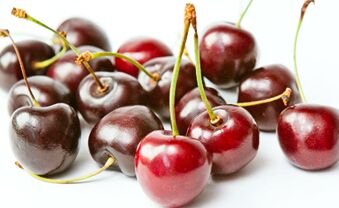樱桃的健康益处
|
It's cherry season again! They're fresh, plentiful, beautiful, and delicious, but, you may be wondering-are cherries actually that good for you? The answer is yes, 100 times yes! Cherries are not only one of the healthiest fruits, they also rank as one of the most health protective foods overall. One cup, or about 21 cherries, contains less than 100 calories and 15% of your daily vitamin C needs. But here are more reasons why this stone fruit is a nutritional all-star.
Cherries are full of antioxidants Cherries are a potent source of antioxidants and anti-inflammatory compounds. These cellular body guards slow down aging and ward off chronic illnesses-including heart disease, cancer, Alzheimer's, diabetes, and obesity. They protect against diabetes The anti-inflammatory effect of cherries helps keep your body healthy; but what's more, cherries rank lower than many fruits on the glycemic index. That means they don't trigger spikes and crashes in your blood sugar and insulin levels. This makes them both protective against diabetes, and important for managing the condition if you already have it. They promote healthy sleep Tart cherries in particular are one of the few food sources of melatonin, a hormone that helps control your sleep-wake cycles. One study in men and women with insomnia found that compared to a placebo, eight ounces of tart cherry juice in the morning and again one to two hours before bed increased sleep time by an hour and 24 minutes. They can provide arthritis relief Several studies have suggested that cherry consumption is beneficial for osteoarthritis sufferers. Regularly incorporating cherries or 100% cherry juice into your meal or snack routine may help lessen your joint pain. They lower the risk of gout attacks Over eight million adults in the U.S. suffer from gout. This inflammatory arthritis is triggered when a waste product called uric acid crystallizes within the joints, causing excruciating pain and swelling. In one study, gout patients who consumed cherries for just two days (both the fresh fruit, as well as cherry extract and juice) showed a 35% lower risk of gout attacks compared to those who did not eat cherries. |









